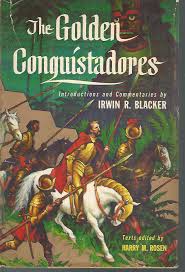
This source from the Encounter period is a letter that was written in 1515 by Pedro Arias Davila, a conqueror and governor of Nicaragua, to Ferdinand V, the King of Spain. Davila has possessed a long-existing rivalry with another conquistador, Vasco Nunez de Balboa. As a result of this rivalry, Davila writes to the king to reveal his frustrations toward the character of Vasco Nunez de Balboa, a fellow conquistador and governor. Davila’s writings also provide insight into the popular European belief during the Encounter period that the subjugation of the Natives was just. Additionally, his writings hint at how Europeans during the Encounter period also imposed Christianity toward the Natives.
In the letter, to emphasize the disagreeable nature of Balboa, Davila repeats the phrase “he is” while listing off Balboa’s traits. For instance, Davila complains, “…he is…avaricious…is very cruel…is of most evil conscience…” (Blacker 1960, 61). The phrasing employed by Davila, which demonstrates a persistent disagreement toward Balboa’s behavior, serves to persuade the king to develop a disliking for Balboa as well.
However, this description of Balboa represents striking hypocrisy on Davila’s part and provides insight into the Europeans’ view during the Encounter period toward the subjugation of Native American people. Specifically, Davila is hypocritical because, as a conquistador who greedily strives to acquire numerous resources and Native American land, he too is guilty of being “avaricious.” Additionally, Davila is hypocritical because, through his role as a conquistador, he too has acted in a “cruel” and “evil” manner by subjugating and killing Natives. Therefore, Davila’s failure to recognize the viciousness of his actions demonstrates that he possesses no remorse for the harm he has caused toward the Natives. This lack of remorse reflects a broader European perspective during the Encounter period that conquering the Natives was just and necessary.
Moreover, in the letter, Davila further describes his loathing for Balboa by claiming that he acts in disobedience and contrast to the Church (Blacker 1960, 61-62). Davila’s claim stresses the importance of Christianity to other conquistadors and Europeans as well. Therefore, this reverence for Christianity hints at how the Christian religion will play a prominent role in Nicaragua and the rest of Latin America during the Encounter period as powerful Christian Europeans will use their positions to impose their religion onto Natives.
Works Cited:
“Letter from Pedro Arias Davila to King Ferdinand V.” In The Golden Conquistadores. Edited by Irwin R. Blacker. Indianapolis: Bobbs-Merrill, 1960.
